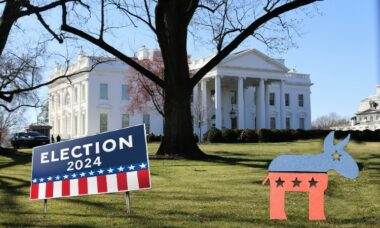 US Republicans and their supporters are going to try to tie Democratic presidential nominee Kamala Harris to the record of outgoing president Joe Biden.
US Republicans and their supporters are going to try to tie Democratic presidential nominee Kamala Harris to the record of outgoing president Joe Biden.
In some ways this is surprising, given the achievements Harris, as vice-president, and Biden made over the last four years. But rising prices, increasing political divisions and a what-have-you-done-for-me-lately attitude mean Harris wants to distance herself as much as possible from the actions of the Biden administration.
One area where Republicans will be looking to attack her is on the proposed menthol ban the current administration sought to bring about. Regardless of whether Harris advocated for the policy, she will have to defend it against those who seek to criticise her through it.
A newly created advertising campaign aims to undermine her popularity by attempting to insinuate the Biden administration worked on a menthol ban when there were more pressing concerns, and that it was offensive for the administration to take away people’s choice to use menthol tobacco products in the first place.
Stance in California and at the federal level
In terms of vaping, at the federal level, Harris was one of several co-sponsors for legislation to raise the minimum purchase age from 18 to 21 for tobacco and vaping products when she was one of the Democratic senators from California.
The aim of the bill was to prevent youth uptake of nicotine products – in particular e-cigarettes. This fed into what became a wider focus on youth public health for the Biden administration with Harris as vice-president. Although Harris was not part of the Biden administration releasing any specific policy proposal on vaping, improving the health of young Americans was a goal and presumably will be again if Harris is elected in November.
Prior to her time at the federal level, Harris also released a statement of support for further regulation of products in California while she was the state’s attorney general.
But the regulations themselves were fairly blasé compared to what came later. The measure was meant to define vaping products as tobacco products in the law so that existing regulations would apply to them and also require them to be sold in child-resistant packaging. This meant that California’s Smoke-Free Act, which prohibits smoking at workplaces, schools, nurseries, restaurants, bars, hospitals and on public transport would have applied to vaping.
It would also have applied California’s Stop Tobacco Access to Kids Enforcement (STAKE) Act, which deals with aspects of age-verified sales, to e-cigarettes.
So in all, there was a degree of difference from the significantly harsher measures brought in after she had left – such as the non-tobacco flavour ban and vaping-specific extra 12.5% tax rate.
Unclear forecast other than youth protection
Although there is no policy statement to clearly indicate what a Harris presidency might mean for the US tobacco alternatives industry, it would be fair to assume her administration would take a sceptical, cautious approach to any developments.
A Harris administration would likely err towards the most obvious harm – bringing in further restrictions on vaping in an attempt to curb youth uptake without regard to the theoretic questions, such as whether doing so might create further smoking initiation.
But specifics – even something like whether Harris would continue with the menthol ban proposal – are harder to define with any degree of certainty.
– Freddie Dawson TobaccoIntelligence staff
Photo: Saul Rodriguez, Kelly Sikkema







